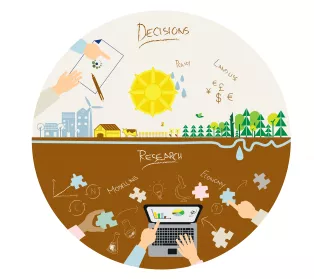Research Umbrella
Finding Solutions to the Combined Consequences of Land-use and Climate Change on Biodiversity and Ecosystem Services
During the 13 years BECC has existed as a research environment, it has been under constant development to meet the aims to perform excellent science, be at the forefront of establishing new research directions, and make significant societal impact.
We are a research environment that is driven by cross-cutting challenges at the interface of biodiversity, ecosystem services and global change, where research excellence is critical for the challenges to be solved. Under this umbrella, our researchers jointly develop and bridge theories and methods from different disciplines, stimulating excellency in both disciplinary, interdisciplinary, and transdisciplinary research.
Our researchers listen to the needs of society by, for example, engaging in international and national fora and by being in close contact with stakeholders. In doing so, we ensure the societal relevance of our research and can put forward scientifically well-grounded recommendations needed for guiding ideal policy avenues and evidence-based decision-making.
Grand Challenge - effective and meaningful biodiversity conservation strategies across scales
Climate change threatens biodiversity directly, but also indirectly through changes in land-use. While protected areas are important for conservation, alternative options need to be considered when facing climate change, including mainstreaming biodiversity in production landscapes. To propose efficient strategies to conserve biodiversity for ethical and functional reasons, we need to better understand how interacting communities of organisms respond to the combined effects of climate change and habitat deterioration on ecological and evolutionary time scales, but also to better account for the effect of conservation strategies on social livelihoods. Closing these knowledge gaps would allow the development of cost-efficient, future-proof conservation strategies.
Grand Challenge - the carbon cycle response to anthropogenic and biophysical drivers
The carbon cycle dynamically couples the biosphere, oceans, and atmosphere, and also links societal and biophysical dimensions of the Earth system. Accurately quantifying and projecting changes in carbon balance is central to understanding and projecting climate change and its impacts on ecosystems and biodiversity. Such knowledge provides a necessary basis for the design of mitigation strategies to sequester greenhouse gases from the atmosphere through land-use and management interventions. This in turn requires a combination of analyses of human behaviour and decision-making, empirical ecology and modelling, informed by studies of past ecosystems, using approaches that account for links across scales from the local to global.
Grand Challenge - integrating different values of ecosystem services into policies and management
The design and assessment of strategies to mitigate and adapt to global change needs to build on projections of climate and land-use changes, including associated uncertainties. Currently, impact models often fail to account for the full range of such mechanistic links between climate, land-use, biodiversity, and ecosystem services across scales. Furthermore, given conflicting perspectives and goals across actors over the use of ecosystem services, there is an urgent need to improve the understanding of how policies, institutions and power relations affect the governance of these services.
BECC Social Science Platform
Understanding theories and methods of different disciplines is often tricky, making crucial inter- and transdisciplinary research a challenge in itself. BECC research is natural sciences heavy. The Social Science Platform, a bottom-up initiative within BECC, is a means to strengthen the potential within social sciences to contribute both disciplinary and interdisciplinary knowledge on how biodiversity, land-use, ecosystem services and climate – including interactions between these challenges – are dealt with in society, with respect to social and political core aspects such as responsibility, economy, effectiveness, justice, and legitimacy.


